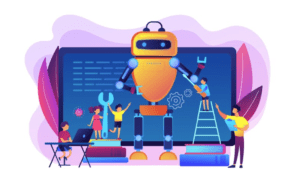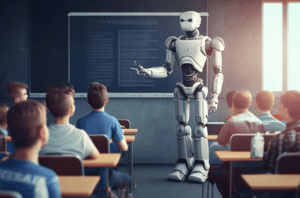Artificial Intelligence and the Future of Education
Artificial Intelligence, frequently contracted as AI, has risen above the limits of sci-fi and consistently inserted itself into the texture of our commonplace presence. From the virtual aides adorning our smartphones to the recommendation algorithms underpinning our streaming services, AI permeates our daily interactions. However, one of the most auspicious domains where AI exerts its influence is the future of education. In this discourse, we shall delve into the metamorphosis that AI heralds in the landscape of teaching and learning and how it has the potential to revolutionize the process of knowledge acquisition.
Deciphering Artificial Intelligence
Before embarking on an exploration of AI’s role in education, it is imperative to fathom the essence of artificial intelligence. AI encompasses the development of computational systems endowed with the capability to execute tasks that typically necessitate human cognitive prowess. Such tasks encompass quandary resolution, speech recognition, the process of erudition, and the act of discernment. AI systems are meticulously crafted to dissect data, identify intricate patterns, and proffer prognostications predicated on the information at their disposal.
AI in the Sphere of Education: The Current Landscape
The assimilation of AI into the educational milieu is already well underway, engendering a paradigm shift in the pedagogical and erudition modus operandi. At present, AI finds application in several domains of education, including but not limited to:
 Personalized Scholastics: AI systems undertake the analysis of a student’s forte and foibles, crafting individualized learning blueprints. This stratagem confers upon each scholar the autonomy to advance at their own cadence and receive targeted guidance precisely where their exigencies are most pronounced.
Personalized Scholastics: AI systems undertake the analysis of a student’s forte and foibles, crafting individualized learning blueprints. This stratagem confers upon each scholar the autonomy to advance at their own cadence and receive targeted guidance precisely where their exigencies are most pronounced.
Automatons of Discourse and Virtual Collaborators: Educational institutions and web-based courses have harnessed AI-driven chatbots and virtual collaborators to field inquiries from scholars, furnish information, and dispense aid around the clock.
Automated Evaluation: AI is proficient in appraising assignments and assessments, culminating in a reduction of educators’ temporal obligations while affording instantaneous feedback to students.
Content Proposals: AI algorithms meticulously dissect the scholarly itinerary of students and furnish pertinent material aimed at enriching their comprehension of a given subject matter.
Preliminary Alert Mechanisms: AI is adept at prognosticating when a scholar is at the precipice of academic lassitude or attrition, thereby enabling educational custodians to intervene promptly and provide supplementary support.
Linguistic Adeptness Acquisition: AI-fueled language acquisition applications dispense personalized tutorials and articulate feedback on pronunciation.
Inclusivity: AI extends its support to students with impairments, delivering real-time transcription services and an array of accessibility accommodations.
The Prospective Trajectory of Pedagogy and Erudition
 As technology advances into the future, AI stands poised to substantially enhance its influence in the realm of education. Envision a scholastic environment where instructors receive substantial support from AI. Within these intelligently orchestrated classrooms, AI-driven contrivances comprehend and address scholars’ queries and assist educators in the orchestration of their pedagogical endeavors. For example, if a student poses a question, the AI apparatus stands ready to provide a prompt response or recommend pertinent educational resources. This dynamic augments the educators’ focus on facilitating dialogues, inculcating critical cogitation, and stimulating creativity, as opposed to the mere impartation of knowledge.
As technology advances into the future, AI stands poised to substantially enhance its influence in the realm of education. Envision a scholastic environment where instructors receive substantial support from AI. Within these intelligently orchestrated classrooms, AI-driven contrivances comprehend and address scholars’ queries and assist educators in the orchestration of their pedagogical endeavors. For example, if a student poses a question, the AI apparatus stands ready to provide a prompt response or recommend pertinent educational resources. This dynamic augments the educators’ focus on facilitating dialogues, inculcating critical cogitation, and stimulating creativity, as opposed to the mere impartation of knowledge.
Tailored Erudition
AI is poised to elevate personalized learning to unprecedented echelons. Each learner shall be the beneficiary of a custom-tailored syllabus that adjusts congruously with their learning tempo and predilections. When a student encounters a specific concept, AI can furnish additional resources, explanations, and practice exercises until they attain mastery. Conversely, if a scholar excels in a particular subject, AI can proffer advanced materials to sustain their intellectual curiosity.
Global Pedagogical Nexus
AI-driven platforms shall foster global interconnectivity, weaving a tapestry that unites scholars and educators from disparate corners of the globe. This international erudition tapestry shall expose students to a melange of perspectives, thereby nurturing cultural appreciation. Scholars can engage in collaborative projects with peers hailing from sundry nations, broadening their horizons and preparing them for a world characterized by interlinked destinies.
Perpetual Erudition
 The evolution of the employment landscape mandates the cultivation of perpetual learning. Herein, AI shall play a pivotal role in bolstering lifelong learning by offering bespoke courses, micro-credentials, and skills recommendations tethered to an individual’s vocational aspirations and proclivities. This shall streamline the process of acquiring new proficiencies and sustaining competitiveness within a rapidly evolving job market.
The evolution of the employment landscape mandates the cultivation of perpetual learning. Herein, AI shall play a pivotal role in bolstering lifelong learning by offering bespoke courses, micro-credentials, and skills recommendations tethered to an individual’s vocational aspirations and proclivities. This shall streamline the process of acquiring new proficiencies and sustaining competitiveness within a rapidly evolving job market.
Hurdles and Ponderables
The tantalizing promise of AI in education is undeniable. However, we must meticulously scrutinize and navigate the myriad of associated challenges and considerations.
Data Custodianship and Privacy Safeguards: AI systems are voracious data collectors and analyzers. Managing the data reservoirs securely, with stringent safeguards in place to protect privacy, becomes imperative.
 Parity and Accessibility: Inequitable access to technology and the internet prevails among the student populace. The quest for an all-encompassing AI-powered education, irrespective of socioeconomic background, remains a formidable challenge.
Parity and Accessibility: Inequitable access to technology and the internet prevails among the student populace. The quest for an all-encompassing AI-powered education, irrespective of socioeconomic background, remains a formidable challenge.
The Role of the Educator: The evolving role of educators, catalyzed by the burgeoning integration of AI, demands thoughtful consideration. AI can serve as a multifaceted adjunct to teaching. However, the irreplaceable human dimension and pedagogical acumen of educators should always be duly honored.
Moral Scrutiny: AI perpetuates biases inherent in the data it is trained on. Scrutinizing the ethical ramifications and ensuring that AI systems remain equitable and unprejudiced is of paramount importance.
Culmination
Artificial intelligence is ready to transform the educational landscape, bestowing upon it a surface of personalization, efficiency, and accessibility. As the AI narrative continues its evolutionary odyssey, it is imperative that we concurrently address the thorny challenges and ponderables that accompany its assimilation into education, such as privacy, parity, and ethics.
The future of pedagogy and erudition brims with potential, especially as artificial intelligence integrates deeply with the educational framework. It’s crucial to find a balance between the power of technology and the essential human connection in the learning process. Artificial intelligence is ready to transform the educational landscape, endowing it with a facade of personalization, efficiency, and accessibility.
In summation, the integration of artificial intelligence into education heralds a future teeming with potential. Indeed, we must tread this path with caution. Our unwavering commitment must ensure that all learners benefit from these transformative innovations. The future of pedagogy and erudition shines brilliantly. With artificial intelligence leading the way, it guides us towards a more personalized, engaging, and accessible educational journey.
